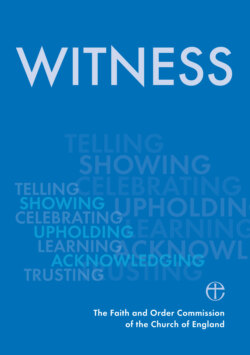Читать книгу Witness - The Faith and Order Commission - Страница 11
ОглавлениеThe church’s witness can take many forms. There is no one template for what it will look like. It might take forms like Joshua’s standing stone, like the Psalmist’s song, like the women rushing from the empty tomb, or like Moses standing up before Pharaoh. It can be costly and dangerous: our word ‘martyr’ comes from the Greek word for ‘witness’, and in many contexts in history, and around the world today, upholding the good news has taken the form of martyrdom. It can also, however, be a matter of everyday words, habits and actions.
Witness can primarily take the form of proclaiming the Good News of the Kingdom. It can take the form of teaching, baptising and nurturing new believers. It can take the form of responding to human need by loving service. It can take the form of transforming the unjust structures of society, challenging violence of every kind, and pursuing peace and reconciliation. It can take the form of striving to safeguard the integrity of creation, and sustaining and renewing the life of the earth.10
This might make it sound like everything in Christian life is witness – and if we say that everything is ‘witness’, the word will cease to name anything in particular. Witness is not, however, the name for one small domain of activity marked off from others, something that we might do from time to time, or that might be a task only for a few of us. Witness is an aspect of the whole of Christian life. What marks something out as witness is where it has come from, and where it points. Witness flows from what we have seen and heard, and what we go on seeing and hearing of God’s work. And witness always points people away from us and towards God. It tells people of God, and helps them to see something more of God’s nature and activity. Wherever we find that seeing and showing, that hearing and telling, we find witness.
All our witnessing takes place in relationship with those amongst whom God has called us to live – our friends and neighbours, our various communities and connections – and it always draws us deeper into those relationships, to see more and show more, hear more and tell more of the love of God. In the life of witness, we are all always both givers and receivers.
How are we going to respond?
Discussion: Bible study
Explore two or more biblical passages that speak about witness. Examples would include:
• Isaiah 43.8–13
• John 15.26–16.15
• Acts 1.1–11
• Acts 22.6–21
• Revelation 1.1–11.
Where in the passages you have looked at might you find some of the themes highlighted in the first Part of the report, with its three main headings of ‘Seeing, hearing and saying’, ‘Pointing away’ and ‘Learning to communicate’?
Are there other themes or insights about witness that strike you in the passages you considered?
Reflection: Immerse
Pick out one of the scriptural references from Part 1 or from the passages listed above and simply live with it for a month. Inhabit that scripture and take it with you in your daily life. Use the scripture to listen to God more closely, to pray to God with more attention and listening. Think about how the scripture might open up and inform your own Christian witness.
